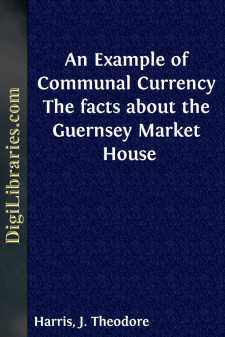Categories
- Antiques & Collectibles 13
- Architecture 36
- Art 48
- Bibles 22
- Biography & Autobiography 813
- Body, Mind & Spirit 142
- Business & Economics 28
- Children's Books 17
- Children's Fiction 14
- Computers 4
- Cooking 94
- Crafts & Hobbies 4
- Drama 346
- Education 46
- Family & Relationships 57
- Fiction 11829
- Games 19
- Gardening 17
- Health & Fitness 34
- History 1377
- House & Home 1
- Humor 147
- Juvenile Fiction 1873
- Juvenile Nonfiction 202
- Language Arts & Disciplines 88
- Law 16
- Literary Collections 686
- Literary Criticism 179
- Mathematics 13
- Medical 41
- Music 40
- Nature 179
- Non-Classifiable 1768
- Performing Arts 7
- Periodicals 1453
- Philosophy 64
- Photography 2
- Poetry 896
- Political Science 203
- Psychology 42
- Reference 154
- Religion 513
- Science 126
- Self-Help 84
- Social Science 81
- Sports & Recreation 34
- Study Aids 3
- Technology & Engineering 59
- Transportation 23
- Travel 463
- True Crime 29
An Example of Communal Currency The facts about the Guernsey Market House
Description:
Excerpt
PREFACE
Those who during the past thirty or forty years have frequented working men's clubs or other centres of discussion in which, here and there, an Owenite survivor or a Chartist veteran was to be found, will often have heard of the Guernsey Market House. Here, it would be explained, was a building provided by the Guernsey community for its own uses, without borrowing, without any toll of interest, and, indeed, without cost. To many a humble disputant the Guernsey Market House seemed, in some mysterious way, to have been exempt from that servitude to previously accumulated capital in which the whole creation groaneth and travaileth. By the simple expedient of paying for the work in Government notes—issued to the purveyors of material, the master-workmen and the operatives, accepted as currency throughout the island, and eventually redeemed out of the annual market revenues—all tribute to the capitalist was avoided. In face of this successful experiment, the fact that we, in England, continued to raise loans and subject ourselves to "drag at each remove a lengthening chain" of interest on public debt, often seemed so perplexingly foolish as to be inexplicable, except as the outcome of some deep-laid plot of "the money power."
When first I heard of this Guernsey Market House, as in some mysterious way exempted from the common lot, I was curious to enquire what transaction had, in fact, taken place in an island which was, after all, not so far removed in space or time from the Lombard Street that I knew. In all the writings of the economists (for which my estimate was at that time, as indeed it is now, such as I could not easily put into appropriate words), I found no mention of this Phœnix among market-houses. I fear that, too hastily, I dismissed the story as mythical.
Now Mr. J. Theodore Harris—having, I suspect, a warmer feeling for the incident than he has allowed to appear in these scientific pages—has done what perhaps I or some other economic student of the eighties or nineties ought to have done, namely, gone to Guernsey to dig up, out of the official records, the incident as it actually occurred. What is interesting is that he has found that the myth of the veteran Owenite or Chartist is, in all essentials, confirmed by the documents. The story is true. The Guernsey Market House was built without a loan and without the payment of interest.
It does not follow, however, that it was any more built without the aid of capital, than was St. Paul's Cathedral or the Manchester Ship Canal. Mr. Harris, contenting himself with the austerely exact record drawn from the documents, does not indulge in any speculative hypothesis as to who provided the capital, or who bore the burden that would otherwise have been interest. Let me use the fuller privilege of the preface-writer, and supply some hypothetical elucidations.
What the Guernsey community did was that which nearly every community has done at one time or another, namely, issue paper money. The part of the story that we do not know is (a) what thereupon happened to the aggregate amount of "currency" of all kinds then in circulation within the island, in relation to the work which that currency had to do; (b) what happened to the prices of commodities....


